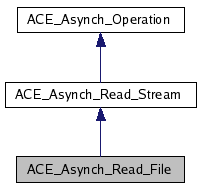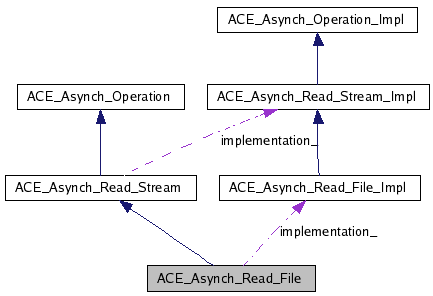
#include <Asynch_IO.h>
Inheritance diagram for ACE_Asynch_Read_File:


Public Member Functions | |
| ACE_Asynch_Read_File (void) | |
| A do nothing constructor. | |
| virtual | ~ACE_Asynch_Read_File (void) |
| Destructor. | |
| int | open (ACE_Handler &handler, ACE_HANDLE handle=ACE_INVALID_HANDLE, const void *completion_key=0, ACE_Proactor *proactor=0) |
| int | read (ACE_Message_Block &message_block, size_t bytes_to_read, unsigned long offset=0, unsigned long offset_high=0, const void *act=0, int priority=0, int signal_number=ACE_SIGRTMIN) |
| int | readv (ACE_Message_Block &message_block, size_t bytes_to_read, unsigned long offset=0, unsigned long offset_high=0, const void *act=0, int priority=0, int signal_number=ACE_SIGRTMIN) |
| virtual ACE_Asynch_Operation_Impl * | implementation (void) const |
| Return the underlying implementation class. | |
Protected Attributes | |
| ACE_Asynch_Read_File_Impl * | implementation_ |
Classes | |
| class | Result |
| This is that class which will be passed back to the {handler} when the asynchronous read completes. This class forwards all the methods to the implementation class. More... | |
Once {open} is called, multiple asynchronous {read}s can started using this class. An ACE_Asynch_Read_File::Result will be passed back to the {handler} when the asynchronous reads completes through the {ACE_Handler::handle_read_file} callback. This class differs slightly from ACE_Asynch_Read_Stream as it allows the user to specify an offset for the read.
| ACE_Asynch_Read_File::ACE_Asynch_Read_File | ( | void | ) |
A do nothing constructor.
| ACE_Asynch_Read_File::~ACE_Asynch_Read_File | ( | void | ) | [virtual] |
Destructor.
| ACE_Asynch_Operation_Impl * ACE_Asynch_Read_File::implementation | ( | void | ) | const [virtual] |
| int ACE_Asynch_Read_File::open | ( | ACE_Handler & | handler, | |
| ACE_HANDLE | handle = ACE_INVALID_HANDLE, |
|||
| const void * | completion_key = 0, |
|||
| ACE_Proactor * | proactor = 0 | |||
| ) |
Initializes the factory with information which will be used with each asynchronous call. If ({handle} == ACE_INVALID_HANDLE), {ACE_Handler::handle} will be called on the {handler} to get the correct handle.
Reimplemented from ACE_Asynch_Read_Stream.
| int ACE_Asynch_Read_File::read | ( | ACE_Message_Block & | message_block, | |
| size_t | bytes_to_read, | |||
| unsigned long | offset = 0, |
|||
| unsigned long | offset_high = 0, |
|||
| const void * | act = 0, |
|||
| int | priority = 0, |
|||
| int | signal_number = ACE_SIGRTMIN | |||
| ) |
This starts off an asynchronous read. Upto {bytes_to_read} will be read and stored in the {message_block}. The read will start at {offset} from the beginning of the file. Priority of the operation is specified by {priority}. On POSIX4-Unix, this is supported. Works like {nice} in Unix. Negative values are not allowed. 0 means priority of the operation same as the process priority. 1 means priority of the operation is one less than process. And so forth. On Win32, this argument is a no-op. {signal_number} is the POSIX4 real-time signal number to be used for the operation. {signal_number} ranges from ACE_SIGRTMIN to ACE_SIGRTMAX. This argument is a no-op on non-POSIX4 systems.
| int ACE_Asynch_Read_File::readv | ( | ACE_Message_Block & | message_block, | |
| size_t | bytes_to_read, | |||
| unsigned long | offset = 0, |
|||
| unsigned long | offset_high = 0, |
|||
| const void * | act = 0, |
|||
| int | priority = 0, |
|||
| int | signal_number = ACE_SIGRTMIN | |||
| ) |
Same as above but with scatter support, through chaining of composite message blocks using the continuation field.
Delegation/implementation class that all methods will be forwarded to.
Reimplemented from ACE_Asynch_Read_Stream.
 1.4.7-1
1.4.7-1